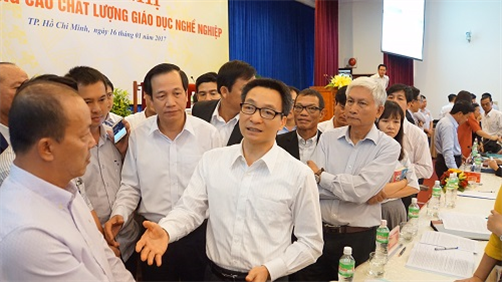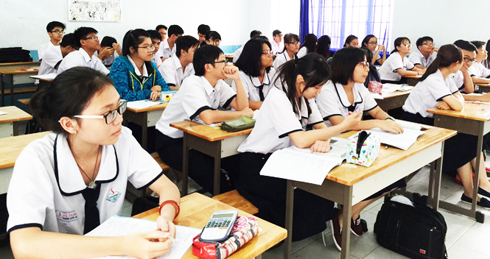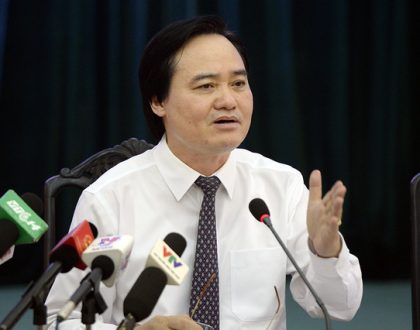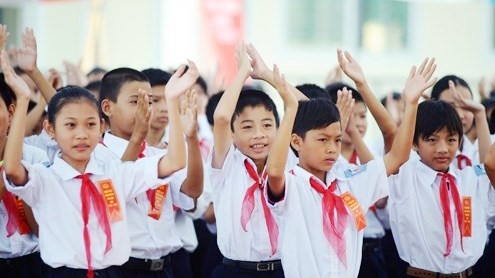On November 27, 2014, the Vocational Education Law was passed by the National Assembly of the XIII legislature at its 8th session and came into effect on July 1, 2015. It can be said that this law strongly institutionalized the policy of fundamental and comprehensive innovation in education in general, and vocational education in particular, in the spirit of the Resolution of the 8th Meeting of the Central Committee of the XI tenure. It addresses many practical inadequacies, creating a new visage for the vocational education system in Vietnam, meeting the requirements for integration with countries in the region and internationally.
1. Regarding the Name of the Law
Following Resolution No. 20/2011/QH13 dated November 26, 2011, on the legislative program of the National Assembly's XIII term, the Government of Vietnam directed the Ministry of Labor, War Invalids, and Social Affairs to cooperate with relevant ministries and sectors to organize the drafting of the Law on Amending and Supplementing Several Articles of the Vocational Training Law. However, according to the amended and supplemented 2013 Constitution of the Socialist Republic of Vietnam, the term "vocational training" does not exist, and only the terms "vocational education" and "vocational learning" are mentioned in Article 61, which regulates education.
Thus, it can be understood that vocational learning, including vocational learning at primary, intermediate, and college levels, all belong to vocational education.
Currently, the international term "Vocational Education and Training" (VET) is widely used, meaning Vocational Education and Training, or "Technical Vocational Education and Training" (TVET), meaning Technical Vocational Education and Training, and both are broadly understood to mean Vocational Education. Vocational Education Laws (VET Laws) in countries often use terms like VET or TVET, and some countries use the specific term Vocational Education for the name of their laws - Vocational Education Law (For example: Vocational Education Laws in Latvia, China, Ireland, etc.).
Therefore, to ensure compliance with the Constitution and integrate with regional and international standards, the Law on Amending and Supplementing Several Articles of the Vocational Training Law is renamed the Law on Vocational Education and Training.
2. New and Progressive Points of the Law on Vocational Education and Training
Law on Vocational Education and Training consists of 8 chapters, 79 articles, and includes many new and progressive points, including several important new specifics:
- Renewing the Vocational Education System
According to the 2005 Education Law, vocational education includes: intermediate professional education and vocational training. Vocational training has primary vocational, intermediate vocational, and college vocational levels. Thus, the Vietnamese education system inadvertently had two intermediate levels and two college levels managed by two different authorities. To address the said shortcomings, the Law on Vocational Education restructured the national education system, comprehensively changing the structure of the vocational education system. The new vocational education system includes: Primary level; Intermediate level and College level.
- Renaming Vocational Education Institutions
With the restructuring of training levels, vocational education institutions have been renamed, including: Vocational Education Centers (consolidation of technical, general, and vocational guidance centers), Intermediate Schools (consolidation of professional intermediate schools and vocational intermediate schools), and Colleges (consolidation of professional colleges and vocational colleges). Essentially, it separates professional colleges from higher education. Higher education includes universities that provide undergraduate, master's, and doctoral programs.
- Renewing Management and Training Organization
Previously, the vocational education field only had the academic year training method. Now, the law introduces two additional training methods in the management organization: Module accumulation training and credit accumulation training. Vocational education institutions can choose their training method based on individual institutions' conditions.
This training method allows the vocational education system to be open and flexible, ensuring smooth transitions between different training levels in the same profession or other professions or transitions to higher education levels within the national education system. Learners are considered central to the training process, allowing them to learn according to their capabilities, conditions, and circumstances; they can learn various contents simultaneously and be accredited through the accumulation of competencies; and the learning duration can be shortened or extended depending on the learner's abilities and conditions.
- Renewing Admission
According to current regulations, vocational training institutions can only admit students based on the scale of each profession registered in the vocational training activity registration certificate issued by competent authorities and cannot exceed this limit. Even if one higher vocational college quota is exceeded, it results in administrative violations. The new law gives vocational education institutions the authority to determine enrollment quotas based on the number and quality of teachers, facilities, and training equipment. Institutions can enroll multiple times a year and either conduct admissions via academic records, entrance exams, or a combination of both.
- Renewing Training Duration for Intermediate Level for Junior High School Graduates
The training duration for the intermediate level for those with junior high school diplomas or higher is reduced to 1-2 years depending on the profession when following the academic year system (current regulations require 3-4 years due to additional high school coursework). Those with junior high school diplomas who wish to continue to higher education levels must accumulate additional high school content, which is optional. Thus, high school content no longer becomes a mandatory content for learners, unlike the former Vocational Training Law and Education Law regulations. For module and credit accumulation training, it requires accumulating enough modules or credits as stipulated by the training program regardless of the number of study years.
- Renewing Training Programs
Previously, under the Vocational Training Law, the Ministry of Labor, War Invalids, and Social Affairs issued framework programs for each profession at the intermediate and college levels. Based on these frameworks, vocational training institutions issued detailed training programs. According to the new Law, the State will not issue framework programs but will grant vocational education institutions autonomy to develop their training programs. According to the draft National Qualifications Framework of Vietnam, it includes 8 levels: Levels 1 and 2 correspond to training periods of less than 3 months (short-term); Level 3 is the primary level; Level 4 is the intermediate level; Level 5 is the college level; Level 6 is undergraduate; Level 7 is postgraduate; and Level 8 is doctoral level. Vocational education institutions will base on the skill standards of each level within the national qualifications framework to develop suitable training programs.
- Renewing Examination, Graduation Recognition, and Diploma Issuance
Current regulations stipulate that learners must take a graduation exam after studying, and if passed, they will be considered for recognition and issuance of graduation diplomas.
With the new training methods, the Law stipulates that for module and credit accumulation programs, if learners accumulate enough modules or credits as per the training program, they will be recognized for graduation and issued diplomas without needing to take a final graduation exam. Graduates at the college level will be issued college diplomas and awarded the title of practical engineer or practical bachelor depending on the profession.
- Renewing Policies for Learners
Policies for learners are robustly reflected in the Law. These policies are considered one of the solutions to streamlining, attracting learners, and making vocational education more appealing. Such policies include:
+ Learners are exempted from tuition fees if they belong to social policy categories; for junior high school graduates (grade 9) attending intermediate level; for difficult-to-recruit professions needed by society and specific professions.
+ Learners enjoy boarding policies for ethnic minorities who are poor, near-poor, or disabled; poor, near-poor ethnic Kinh people, or disabled people with permanent residence in areas with extremely difficult socio-economic conditions, ethnic minority areas, borders, islands; students from ethnic boarding high schools when attending the intermediate or college level.
+ Graduates are recruited into state agencies, political-social organizations, and public service providers; they receive salaries based on agreements with employers based on job positions and working competence but not lower than the minimum wage, statutory pay rate, or starting salary.
- Renewing Policies for Educators
Under current regulations, vocational educators do not have titles, specific salary scales, nor proper honors and incentive policies. To address these issues, the law specifies titles for educators within vocational education institutions, specifies salary scales linked to titles, clarifies honor policies (people's teachers, meritorious teachers), extends working time for educators with high qualifications, academic titles, and high skills. Educators teaching both theory and practice receive preferential allowances according to Government regulations.
- Renewing Policies Linking Vocational Education Institutions with Enterprises
Enterprises participating in vocational education activities hold equal rights and responsibilities in vocational education activities. All costs for vocational education activities are deductible when calculating taxable income. This is not only specified in the Vocational Education Law but also detailed in the Law on Amending and Supplementing Several Articles of the Tax Laws passed by the National Assembly, XIII term, 8th session.
- Renewing Self-Management of Vocational Education Institutions
Vocational education institutions can autonomously manage activities in organization and personnel, finance and assets, training and technology, and international cooperation, ensuring training quality according to legal regulations. Public vocational education institutions that ensure complete operational expenses for regular activities and investment will operate autonomously, being fully responsible as per Government regulations.
- Renewing International Cooperation in Vocational Education
Recognizing integration as an inevitable trend, the Law encompasses a specific section on international cooperation. It covers forms of international cooperation, foreign training linkages, establishing representative offices of foreign institutions in Vietnam, and Vietnamese vocational education institutions abroad, recognizing equivalent qualifications for those who have graduated from vocational training levels abroad, and detailing the process and procedures to recognize academic degrees and vocational certificates awarded by foreign vocational education institutions.
In addition to the above points, the Law includes many other important contents such as renewing objectives, renewing vocational training quality assessment, policies on private investment, etc.
3. Organizing the Implementation of the Law
The Law on Vocational Education and Training takes effect on July 1, 2015. To implement the Law, many actions must be prepared. Some key points include:
- Reconstructing the Vocational Education System
The General Department of Vocational Training will be renamed the General Department of Vocational Education, and the organizational structure and management of vocational education from central to local levels will be consolidated and supplemented to match the new functions and tasks;
Vocational training institutions, professional intermediate schools, and colleges will be renamed as per the Law. Vocational training centers will be renamed vocational education centers to perform dual functions of vocational training and vocational guidance. Existing local technical and vocational guidance centers under general education will be merged into vocational education centers.
- Drafting Implementation Guidance Documents
Following Decision No. 2296/QD-TTg dated December 17, 2014, by the Prime Minister on issuing the list and assigning the drafting of detailed guidance documents for the Law on Vocational Education and Training, the Ministry of Labor, War Invalids, and Social Affairs is tasked with leading the drafting of 3 decrees by the government, 3 decisions by the Prime Minister, guiding some contents as prescribed by the Law.
Additionally, the General Department of Vocational Training is drafting 24 circulars guiding various contents within the authority of central state management on vocational education and amending other related legal documents to ensure the uniformity and consistency of the vocational education legal system.
- Law Publicity and Dissemination
Following the Law on Dissemination and Legal Education, to ensure all citizens, especially those directly affected by the Law, understand its provisions, the Law on Vocational Education and Training will be publicized and disseminated to all subjects through various forms from now until 2015, 2016.
- Other Work
Guiding the admissions, developing training programs and curriculums according to the Law; reviewing and planning the network of vocational education institutions under Article 8 of the Law; adjusting and supplementing the planning of key professions and high-quality schools to fit the new system.
Integration presents both opportunities and challenges for each nation. Vietnam is transforming strongly to engage deeply in regional and international arenas. With the Law on Vocational Education and Training, containing many comprehensive and breakthrough innovations, Vietnam's vocational education is sure to integrate well with ASEAN countries and internationally, enhancing the position of Vietnamese labor on the global stage.
Source: molisa.gov.vn
 Article table of contents
Article table of contents






.Medium.png)
.Medium.png)
.Medium.png)
.Medium.png)
